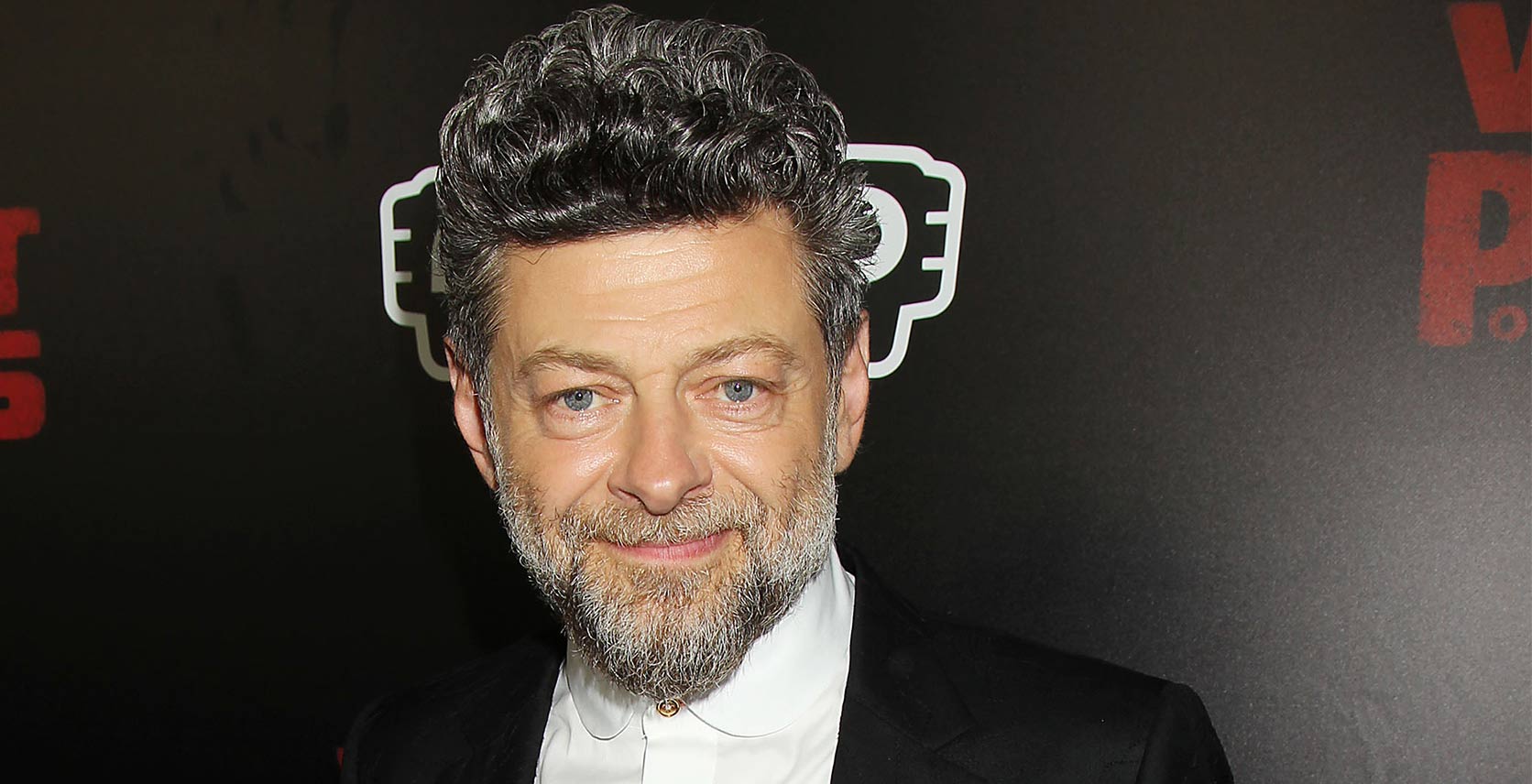Just Give Andy Serkis a Damn Oscar Already
It’s Oscar buzz season, which means we’re hearing the usual names being bandied about again. Your Gary Oldmans, your Daniel Day-Lewis’, your Denzel Washingtons — all considered favourites for the Best Actor trophy. But there’s a name you’re just as likely not to hear; one we’d argue is equally as deserving as the other names, if not more. That name is Andy Serkis — the most shafted name in Hollywood.
You’ve seen Serkis in movies. Sort of. He’s the overlord of motion-capture, a type of performance in which actors’ movements and facial expressions are digitized to create a non-human character. It’s allowed him to play the tiny, very senior citizen Gollum in The Lord of the Rings trilogy; a gargantuan gorilla in 2005’s King Kong; and the pasty, bulbous Supreme Leader Snoke in the latest Star Wars trilogy. This year, he pushed the motion-capture envelope even further as Caesar, the sentient chimp general at the centre of War for the Planet of the Apes (out on Blu-ray and DVD now). It was a universally lauded performance (the film currently boasts a 93 per cent rating on Rotten Tomatoes), Serkis displaying a level of nuance and emotional complexity (while playing a fucking monkey, mind you) worthy of a Charlton Heston freakout.
But the chances of 53-year-old actor getting an Oscar nod for his role in Apes are slim. Despite numerous thinkpieces and campaigns over the years calling for the Academy to give Serkis a nomination, or at least a special citation, it has yet to happen. The standard rejoinder among visual effects naysayers is that there’s more going on in Andy’s roles than what he brings to them; that you can’t tell where the animation ends and the acting begins.
And yet, for some odd reason, Serkis remains the one person everyone, from Peter Jackson to Marvel to Lucasfilm, goes to when trying to figure out how to digitally capture and render a performance. Maybe it’s because he brings an unprecedented level of intricacy and emotivity to the form, or maybe it’s because he’s box office Viagra (in BoxOfficeMojo.com’s ranking of actors by their ticket sales, he’s surpassed The Rock, Brad Pitt, and Mark Wahlberg, among other more famous names). Either way, one thing’s indisputable: Serkis isn’t just one of the best motion-capture artists out there, he’s one of the best actors in Hollywood, period. It’s about time everyone recognizes just how precious he is.
I must say, for a guy who’s played a monkey over the course of three movies, you’ve displayed an insane amount of range. How’d you pull that off?
It starts off with me reading the script and, really, the most important thing I found with Caesar was that he is this outsider character. He’s an orphaned chimpanzee who’s brought up with human beings and with love. So he believes himself to be human in that respect, until his teenage years, when when he’s flown into the sanctuary with other apes. Because he’s an outsider, and has yet to find out what he is as an ape, he’s able to be empathetic towards all of the different kinds of apes in the sanctuary. So, he becomes the de facto leader of the chimpanzees but also the orangutans, the gorillas, the bonobos, and doesn’t judge them differently. Of course, added to all this, he’s got this drug coursing through his veins, which is causing him to evolve at a rapid rate of knots.
So there were lots of decisions in the first film about how he evolves from a pure chimpanzee to more physically and emotionally humanlike, and that, of course, continues through to the second movie where he becomes a leader. I based him on a real chimpanzee in the first film called Oliver, who was this very humanlike chimpanzee. In the second, I was really looking more to human leaders as inspiration, so I ended up basing him on Nelson Mendela, as he’s trying to find the peaceful solution to conflict between humans and apes. In the third film, where he sees his family being killed, I really played him much more internally, as if I were Caesar. How would I deal with this? Would I ever be able to be empathetic again towards the human species? So that’s the journey. It is an extraordinary arc over three films, and to be able to play a character all the way from infancy through to the end of a his life is a very rare-but-wonderful opportunity as an actor.
Definitely! And I bet it must be hard on the knees, playing a monkey.
Ha! It was hard on the knees in the first film, it was! Just because there was a lot more quadrupeding around as a young chimpanzee with all that energy. But as Caesar evolves physically, grows, and becomes more humanlike, I spend less time on all fours. But I did wear these very heavy weights to make the character seem, just in the way he moved, slightly more encumbered – literally weighed down with the pressure of being a leader. It is and was a very physical role from beginning to end.
Lots of people are saying that this role, as with many of your other roles, deserves an Oscar nomination. What do you think about that?
Well, you know, I think that, for me, the most important thing is that people still need to fully understand what performance-capture is. Performance-capture isn’t a genre or a type of acting. People say there should be a special category or something like that for it, and I absolutely, fundamentally believe there shouldn’t be. Because the acting process is exactly the same if you’re playing a character using performance-capture technology, which is just a bunch of different cameras used to record your performance, as well as film cameras. For me, there’s absolutely no difference between playing a character in a costume and makeup, or putting on a performance-capture suit and going on set and working with the director and other actors and then having a virtual makeup applied to your performance afterwards. For me, that’s the most important thing. Awards are sort of a way of acknowledging it. This all questions the nature of acting in a way, but it shouldn’t, because after all, the process of becoming a character is exactly the same, no matter how it’s finally manifested.
Do you think the Academy has an aversion to recognizing performance-capture roles as legitimate acting roles?
Well, this is what I’m saying. It’s interesting because you can look at, for instance, a progression of roles going back to Charles Laughton playing The Hunchback of Notre Dame or John Hurt playing The Elephant Man or, in fact, Gary Oldman playing Winston Churchill in The Darkest Hour. These are all actors who are completely unidentifiable as themselves and have a team of artists who have created a look for a character. But you wouldn’t necessarily say a special category should be created for them; you’d just assume that they are acting the role. The same needs to be understood about what we do for performance capture — we are acting a role on set, we are authoring and creating the emotion of a character. Everything about that, the acting choices, are exactly the same, as if you were wearing prosthetic makeup. It’s just how it’s finally manifested that’s different.
But clearly you’ve become the heavyweight in the performance-capture realm. Is there anything different that goes into mastering a performance-capture role?
Again, I’m saying it isn’t unique. Maybe it is in the sense that, yes, if you’re playing an ape, you have to study apes, and you have to understand their physicality and behaviour. But Caesar isn’t just an ape; he’s an ape who’s evolving into a very humanlike character. It’s like every single character you play as an actor— it requires research and investigation into psychology, physicality, emotion, and a building together of all those things, and trying to find a way of expressing those things. But throughout it all you’re putting yourself under the microscope, and I’m putting myself under the microscope to connect with Caesar. And that’s what you do in acting. You use your imagination and your emotional muscle memory to make these events feel truthful.
And how exactly do you connect with Caesar on an emotional basis? Do you see any similarities between you and this militant ape?
Well yeah, I do think, as I say, that his ability to be empathetic comes from his sense of being an outsider and I suppose I feel that. I feel connected to Caesar deeply in that way because of my heritage. My father was Iraqi and I was brought up in England. I always felt a sense of being a kind of global traveler, really, from a very early age, and therefore not particularly just seeing the world from one point of view, but being able to see a bigger picture in some way.
You develop unique voices for each of your roles. What kind of thought goes into creating a voice for a character?
A voice is obviously part of the expression that comes with the psychology and the emotional drive of the character. If you take Gollum, for instance, the way that Gollum sounds is bound up with the guilt of killing his cousin by strangling him. And that guilt has been trapped in his own thoughts and constricts and disables him in a way. So when I’m searching for the voice, it isn’t sort of plucking it out of thin air, it’s linking it physically, emotionally, and psychologically to what that character is.
Can you tell me what went into the development of Supreme Leader Snoke’s voice?
Again, he’s a deeply wounded character, and his anger and rage is sort of conflicted with his deformities. So the way that voice comes out is very much bound up with a sense of revenge and a desire to use power from the dark side of the Force to maximum effect.
When you first got the call to play Gollum in Lord of the Rings, were you apprehensive of playing a role with this weird, newfangled performance-capture technology?
Well yeah, because that technology really hadn’t been fully examined before. It had never really had been used in the filmmaking industry successfully. So it was a gamble to do that. But you know, I was working with a great visionary, Peter Jackson, so it was a certainly a gamble that was immediately worth taking.
And what about the future of performance-capture in film? How do you see it evolving?
The thing is, performance-capture sits very centrally in next-generation storytelling across lots of different platforms and arenas. So, it’s obviously been used in films, but also video games, of course. Performance-capture is used increasingly in video games because now their scripts are so developed and actors’ performances are being seen and valued in them. And then, with all the emerging technologies like virtual reality and augmented reality, it’s an ever-increasing platform for actors to express themselves. It allows them to play anything, to play any character. That’s the most extraordinary thing about it.
It’s the end of typecasting.
It is absolutely the end of typecasting.










